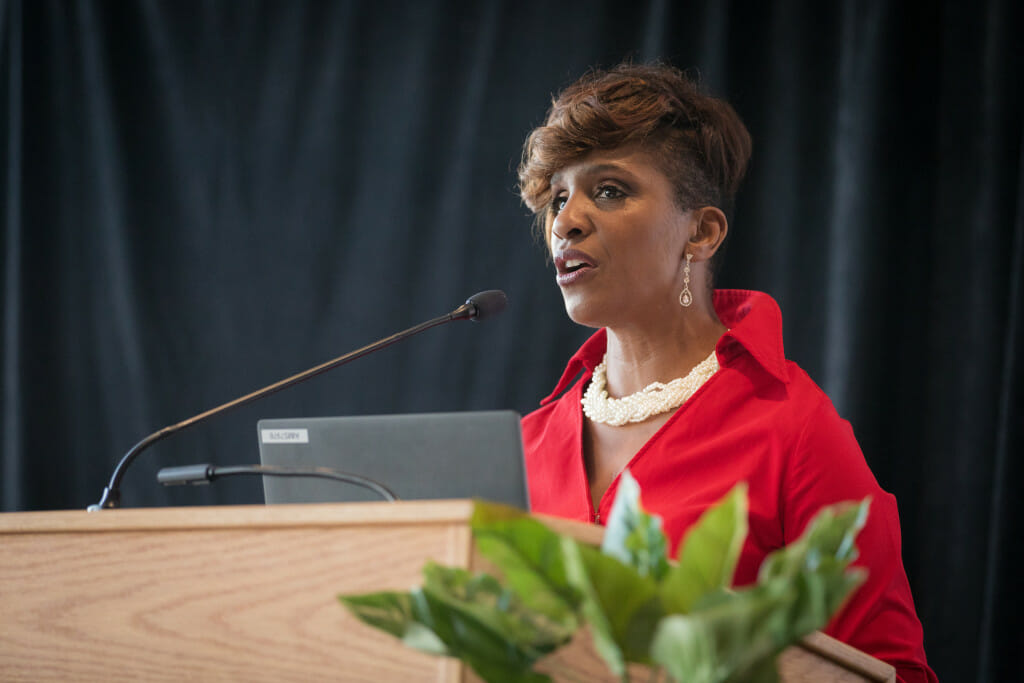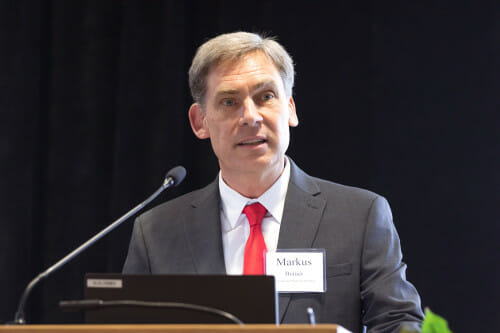New UW institute to study evidence-based solutions to diversity-related challenges

“How are we going to live, work and learn together? I believe that the answer is this: People of goodwill, armed with good research, can find actionable solutions for the greater good,” said Angela Byars-Winston, chair of the newly created Institute for Diversity Science. The institute will be a hub for studying discrimination and evaluating solutions. The institute aims to spark new research and collaborations on campus and with community and industry partners. Todd Brown/SMPH Media Solutions
The University of Wisconsin–Madison has launched the Institute for Diversity Science as a hub for the many researchers on campus studying causes and consequences of discrimination and evaluating solutions that may help companies and cities grow — and grow more successful — as welcoming and inclusive communities.
Diversity science as a discipline seeks to identify the most effective ways to allow all people to strive and succeed. It spans fields, including everything from better policies and practices to improve hiring and retention in the workplace, to reducing educational achievement gaps and reducing the health disparities faced by rural and other underserved communities.
Wisconsin is saddled with some of the country’s largest racial disparities in employment, educational attainment, incarceration, wealth and healthcare access. The challenges are so daunting, they can seem insurmountable, said Angela Byars-Winston, chair of the Institute for Diversity Science.
“How are we going to live, work and learn together? I believe that the answer is this: People of goodwill, armed with good research, can find actionable solutions for the greater good,” Byars-Winston said at the institute’s kick-off event on Feb. 7.
That’s where UW–Madison’s broad scientific expertise and history of tackling big research challenges come in.
“Wisconsin has world-renowned scholars and practitioners in the areas of equity, diversity, inclusion and belonging,” Byars-Winston said. “Surely, we can advance diversity science research.”

Professor of Psychology Markus Brauer will serve as the Institute for Diversity Science’s executive director. He and Byars-Winston intend to add a measure of empirical heft to diversity- and inclusion-boosting programs, serving as a resource for reliable, evidence-based information about diversity science and initiatives for business and industry groups, policymakers and others. Todd Brown/SMPH Media Solutions
As a UW–Madison professor of medicine and vocational psychologist, Byars-Winston’s own research focuses on how race and gender weigh on people’s professional careers. Through the institute, Byars-Winston aims to convene others in the field. Joining in the effort is Markus Brauer, a UW–Madison psychology professor who studies ways to affect behavioral change and will serve as executive director of the Institute for Diversity Science. They intend to add a measure of empirical heft to diversity- and inclusion-boosting programs, serving as a resource for reliable, evidence-based information about diversity science and initiatives for business and industry groups, policymakers and others.
“The work is critical, so we can’t afford to wait. But lurking in the background is the nagging question, ‘Can we do better?’” said John Karl Scholz, UW–Madison provost. “This institute will help bring together scholars from all our schools and colleges who are interested in advancing evidence-based practices, methods and initiatives that have been shown to make a difference and to lead to significant improvements in diversity and related outcomes.”
Leaders throughout the university — including School of Human Ecology Dean Soyeon Shim and Binnu Palta Hill, assistant dean for diversity and inclusion in the Wisconsin School of Business — emphasized the enthusiasm and support the institute would find across campus. The institute aims to spark new research and collaborations through planned seed grants, an annual conference, seminars and other events, and partnerships with community and industry groups. The Provost and the School of Medicine and Public Health are providing start-up support for the institute, which seeks to become self-sufficient by securing extramural funding.
“This is where the Institute for Diversity Science plays a key role — by conducting large-scale evaluation studies, innovative research, collaborations and interdisciplinary projects that are characterized by proven methodologies and rigorous scientific research,” said LaVar Charleston, UW–Madison deputy vice chancellor for diversity and inclusion, vice provost and chief diversity officer.
“The collaborative research infrastructure created by the Institute for Diversity Science will be the guiding light that brings together scholars from the social sciences, humanities and countless other academic disciplines,” said Robert Golden, dean of the UW School of Medicine and Public Health. “So that together, we can study, identify and advance the best solutions to the most complex and the most important imperatives that are facing our society.”
Businesses recognize the competitive advantages of workplaces where people share a sense of belonging, according to Zach Brandon, president of the Greater Madison Chamber of Commerce. The impulse to take any kind of immediate action is strong enough that diversity training has become an $8-billion-a-year industry in the United States. The institute’s leaders believe there is need to ground such interventions on measures that research supports as being effective.
“Twenty-five years ago, when I was in college, diversity became a sort of in-vogue term, but there wasn’t science behind it. It was just an instinct,” Brandon told the crowd at the Institute for Diversity Science inaugural event. “We now know, based on science, that diversity leads to better decision-making, better systems, better investments, better companies, a better workforce.”
Alex Gee, lead pastor of Madison’s Fountain of Life Church, president and founder of the Nehemiah Center for Urban Leadership Development and a UW–Madison alum, sees in the university’s commitment to the Institute for Diversity Science a future in which his alma mater and Madison’s Black community find the sort of mutual benefits described by the Wisconsin Idea at the opening of the 20th Century.
“This is about knowledge. This is about information. This is also about people of color living longer and fuller lives because of this campus,” Gee said. “If we really do this right, we learn from each other. We support each other. We make this community and this university, both, world-class.”
Brauer echoed those lofty goals and pointed to the transformative power of new resources — including funding initiatives at federal agencies like the National Science Foundations and National Institutes of Health and nonprofit organizations such as the NAACP and Chan Zuckerberg Initiative — and fresh ideas on campus, where a recent call for research proposals on reducing inequality drew more than 70 submissions.
“We don’t want to do abstract work in our ivory tower, unrelated to our community,” Brauer said. “We want to find concrete solutions to diversity-related problems. We want to make a difference, to contribute to a society where all members can strive and succeed and feel included, welcome and respected.”
Subscribe to Wisconsin Ideas
Want more stories of the Wisconsin Idea in action? Sign-up for our monthly e-newsletter highlighting how Badgers are taking their education and research beyond the boundaries of the classroom to improve lives.
Tags: diversity, research, The Wisconsin Idea




